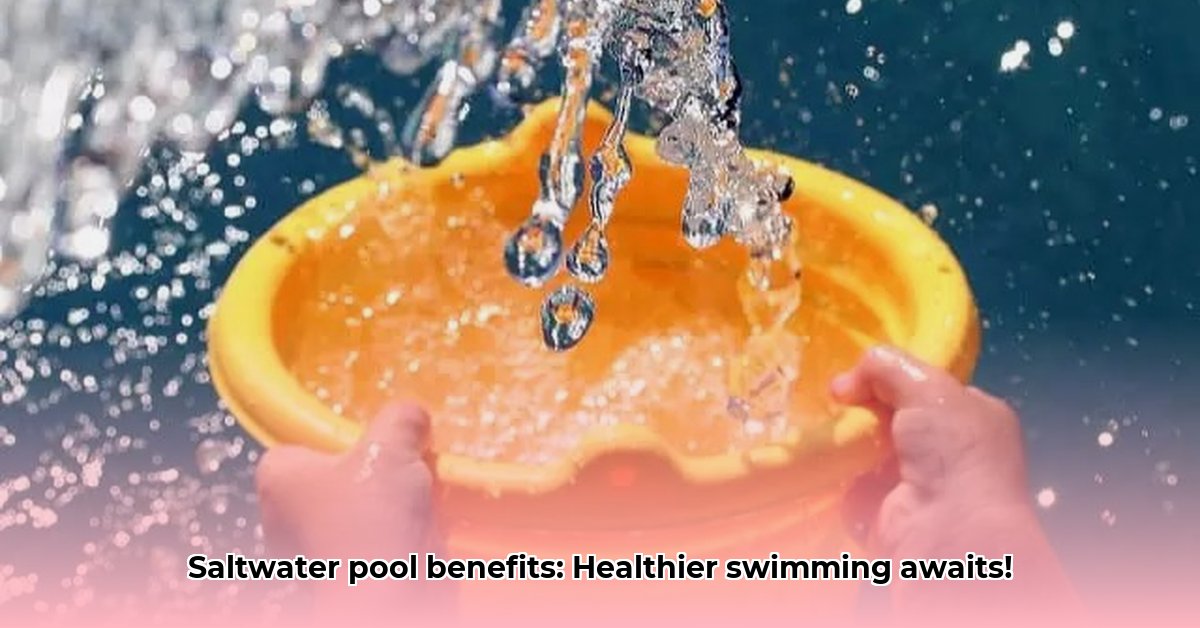
What Are the Benefits of a Saltwater Pool?
Considering a pool but want a gentler, more environmentally friendly option? A saltwater pool might be the perfect choice for your backyard oasis. Let's explore the advantages.
Healthier Swimming: Gentler on Skin and Eyes
One major benefit is the gentler feel on skin and eyes. Traditional chlorine pools can leave you feeling dry and itchy, with burning eyes. Saltwater pools, however, use a salt chlorine generator to produce chlorine naturally – resulting in a much milder chlorine level. This makes them ideal for sensitive skin or allergies. It's the difference between a harsh scrub and a gentle shower – a much more comfortable swimming experience for everyone.
Simpler Maintenance: More Swim Time, Less Scrub Time
Saltwater pools require significantly less chemical management than traditional chlorine pools. The salt chlorine generator automatically produces chlorine, reducing your hands-on work. While you'll still test and maintain water chemistry, it’s much easier and faster. This means more time relaxing and less time fussing with chemicals; a substantial time saving.
A Fresher, More Inviting Atmosphere: Goodbye Harsh Chlorine Smell
Forget the strong chlorine smell! Saltwater pools have a much more subtle, natural scent, often described as fresh and clean, like ocean air. This creates a more welcoming and relaxing atmosphere, enhancing your enjoyment of the pool. This fresher scent is a significant improvement over the typical "pool smell."
Eco-Friendly Choice: A Greener Pool
Saltwater pools are a more environmentally friendly option, using less chemical chlorine. While the generator's manufacturing and disposal have environmental impacts, the reduced chlorine use makes them a more sustainable choice. Ongoing research continues to explore the long-term environmental impacts of various pool systems.
Long-Term Cost Savings: An Investment That Pays Off
While the initial cost of a saltwater pool system is higher, long-term savings on chemicals often offset this. The ongoing expense of buying, storing, and transporting chemicals is significantly reduced. However, remember to factor in the eventual replacement cost of the salt chlorine generator.
Maintaining Your Saltwater Paradise: A Step-by-Step Guide
Maintaining your pool's pristine condition involves these simple steps:
Regular Water Testing: Test your water weekly (more frequently during heavy use or extreme weather). Check chlorine, pH, alkalinity, and salt levels using inexpensive test strips.
Chemical Adjustments (As Needed): Adjust levels as needed using appropriate chemicals. Never mix chemicals. Always follow manufacturer instructions.
Consistent Cleaning: Regularly brush and vacuum to remove debris and algae, improving both appearance and hygiene.
Filter Maintenance: Clean or replace your filter according to the manufacturer's instructions. A clean filter ensures efficient water circulation.
Generator Maintenance: Consult your generator's manual for cleaning, cell replacement, and servicing instructions. Proper maintenance extends its lifespan significantly.
Weighing the Pros and Cons: Making the Right Choice
| Feature | Pros | Cons |
|---|---|---|
| Water Quality | Gentler on skin and eyes; less harsh chemical smell; easier to maintain. | Requires regular testing and adjustments; still needs chemical balancing; salt levels need monitoring |
| Maintenance | Less frequent chemical additions; often less overall work. | Needs specialized equipment (salt chlorine generator), which requires maintenance and eventual replacement |
| Initial Cost | May be a higher upfront investment. | Higher initial installation cost; potential for higher repair costs if the generator malfunctions. |
| Environmental Impact | Uses less chlorine, generally considered more environmentally friendly | Generator manufacturing and disposal have environmental impact; ongoing research is needed. |
Ultimately, the best choice depends on your needs, preferences, and budget. Consider consulting a pool professional for personalized recommendations.
How to Prevent Saltwater Pool Corrosion and Scaling
Saltwater's higher conductivity accelerates corrosion. This means your pool's metal parts are at greater risk of rusting. Here's how to mitigate this:
Sacrificial Anodes: These small metal pieces corrode instead of your pool equipment, protecting it. Regular inspection and replacement (every 2-3 years) is crucial.
Equipotential Bonding: Connect all metal parts to create a single electrical pathway, preventing stray currents from concentrating on one component. A professional should handle this.
Regular Water Chemistry Checks: Maintaining correct pH and alkalinity levels is essential to prevent accelerated corrosion.
Inspection and Maintenance: Regularly inspect your pool equipment for rust or pitting, addressing any issues promptly.
Key Takeaways: Three Pivotal Points for Saltwater Pool Success
- Gentle on skin and eyes: Saltwater pools provide a more comfortable swimming experience compared to traditional chlorine pools.
- Simplified maintenance: Automated chlorine generation reduces the time and effort required for chemical management.
- Long-term cost savings: While initial investment is higher, reduced chemical costs often outweigh the difference over time.
Remember, proactive prevention is key to enjoying your saltwater pool for years to come!